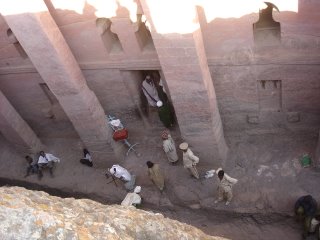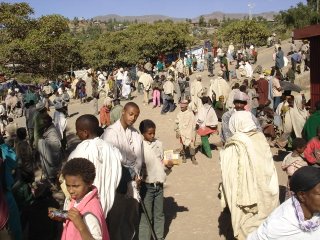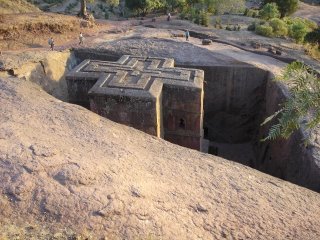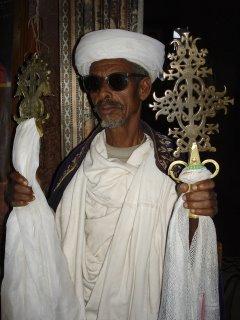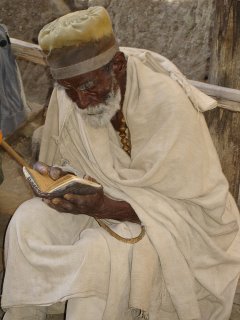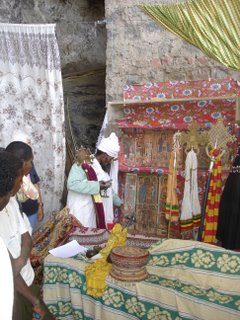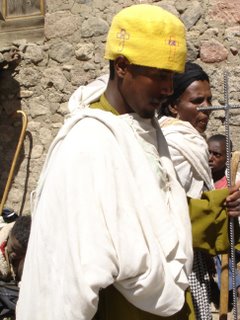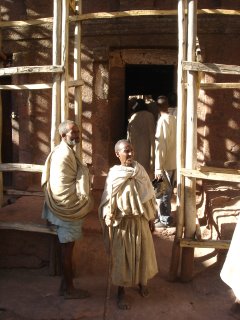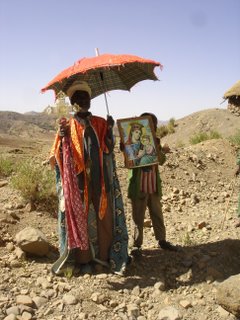Äthiopien die Zweite
Wünsch euch eine gute Zeit und bis bald wieder aus Addis!!
lg Dom!n!K
Das Abenteuer Äthiopien - Das Leben in einer neuen Welt
Krieg ist Frieden Die Paradoxie der globalen Sicherheitspolitik hat Orwells literarische Vision längst eingeholt. Am Beispiel von Äthiopien lässt sich trefflich zeigen, wie „Frieden“ als Mittel der Gewalt die Politik des 21. Jahrhunderts bestimmt. VON BELACHEW GEBREWOLD
Somalia's Islamic forces declare 'holy war' against Ethiopia
"I urge all the Somali people to wage holy war against the Ethiopians," said top Islamic leader Sheik Sharif Sheik Ahmed, wearing combat fatigues and holding aloft an AK-47 assault rifle.
"Ethiopian troops have intentionally invaded our land," he said. "We will counter them soon."
His comments came hours after residents said hundreds of Ethiopian and government troops forced Islamic fighters to abandon Bur Haqaba, a strategic hilltop town.
Sheik Yusuf Indahaadde, the national security chairman for the Islamic group, claimed that 35,000 Ethiopian troops were on Somali soil, but did not give any further details. Foreign observers, however, have put the number in the hundreds.
"This is a declaration of war," he said. "We will not wait any more. We will defend the integrity of our land."
The Islamic courts have declared holy war against Ethiopia on a number of occasions in recent months, but have so far avoided any direct military confrontation.
Somalia has not had an effective national government since 1991, when warlords overthrew dictator Mohammed Siad Barre and then turned on one another, throwing the country into anarchy.
A transitional government was formed in 2004 with U.N. help in hopes of restoring order after years of lawlessness. But it has struggled to assert authority, while the Islamic movement seized the capital, Mogadishu, in June and now controls much of the south.
Tensions between the Islamic movement, which is expanding control over large parts of the war-ravaged country, and the weakened government are high. Both sides have accused each other of violating a tentative peace agreement signed in Khartoum, Sudan in September.
The Islamic group opposes any outside intervention, and is particularly incensed at any role played by Ethiopia, Somalia's historic rival.
Somalia's weak but internationally recognized government publicly denies it is being supported by Ethiopian troops. However, government officials, speaking on condition of anonymity because they were not authorized to speak to the media, said about 6,000 Ethiopian troops are in Somalia.
Ethiopian officials have denied involvement in Somalia — although diplomats, journalists and Somalis have seen their troops in the country. Ethiopians were seen patrolling Baidoa in 11 armored vehicles mounted with anti-aircraft guns Monday.
The reports from Bur Hakaba prompted another denial from Ethiopia.
"Any accusations about Ethiopian troops inside Somalia is false," said Solomon Abebe, a spokesman for Ethiopia's Foreign Affairs Ministry.
Islamic officials said three Ethiopian battalions totaling 750 men alongside government militia rode into Bur Haqaba on Monday morning without firing a shot. The town was taken over by Islamic forces in late June.
Bur Haqaba is perched along six hilltops, allowing forces there to control the only road from the Somali capital, Mogadishu, which the Islamic movement controls, and Baidoa, the only town the U.N.-backed government controls.
The Islamic group's strict and often severe interpretation of Islam raises memories of Afghanistan's Taliban, which was ousted by a U.S.-led campaign for harboring Osama bin Laden and his al-Qaeda fighters.
The United States has accused Somalia's Islamic group of sheltering suspects in the 1998 al-Qaeda bombings of U.S. embassies in Kenya and Tanzania. Bin Laden has said Somalia is a battleground in his war on the West. (Quelle)
Lalibela oder Neu-Jerusalem ist eine heilige Stadt und Wallfahrtsort in Äthiopien. Lalibela liegt in der vormaligen Provinz von Wollo. Der Ort liegt 2500 m. über N.N.
Lalibela ist weltweit bekannt für die monolithischen elf Kirchen, die - überwiegend mehrgeschossig - in rote Basaltlava gemeiselt sind. Die Kirchen entstanden beginnend mit der Regentschaft von König Lalibela, auch bekannt unter dem Namen Heiliger Lalibela (ein Mitglied der Zagwe Dynastie) im 12. Jahrhundert. Wahrscheinlich wurde insgesamt 100 Jahre an der Anlage gebaut. In dieser Zeit blühte der christliche Glauben in Äthiopien, die Kirchen werden auch als Symbol für die enge Verbundenheit der äthiopischen Christen mit dem Heiligen Land verstanden. Heute zählen diese Kirchen zum Weltkulturerbe der UNESCO. Lalibela hat eine lange christliche Tradition der koptischen Kirche und ist ein Pilgerort für viele Christen.
